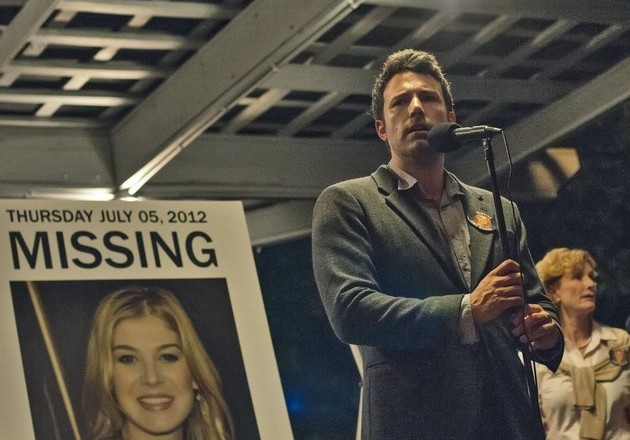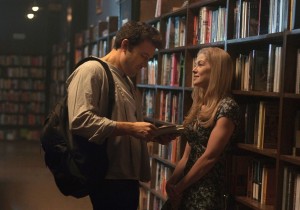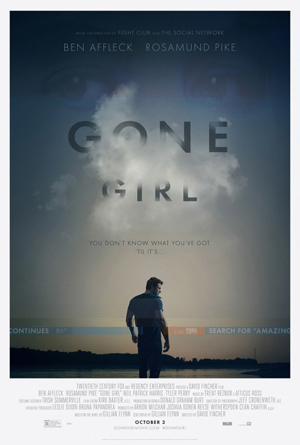
Bleakly Satirical Girl Speaks Unsettling Marital Truth
It is Nick (Ben Affleck) and Amy Dunne’s (Rosamund Pike) fifth wedding anniversary. It is not wine and roses, the last year-plus of marriage nowhere near as filled with love and understanding as the first few overflowed with. Yet that doesn’t lessen Nick’s worry when he’s called home by a mysterious phone call from his neighbor to discover the door open, the house a chaotic mess and his wife missing. Something’s happened, Amy gone from the premises apparently by force, the understandably shaken husband calling the police.
Detective Rhonda Boney (Kim Dickens) is vexed by the case right from the start. Something’s wrong with the whole setup, and while her partner Officer Gilpin (Patrick Fugit) seems all but ready to slap the cuffs on Nick and call it a day, she’s not so sure everything is as it appears. She doesn’t trust the husband, believes he’s lying through his teeth, but she’s also just as distrustful of the crime scene itself, so many things refusing to add up the detective wants to take her time and analyze as many of the facts she can before making an arrest.
By all accounts author Gillian Flynn’s Gone Girl is a solid piece of fiction that has delighted readers with its twists and turns. Having not read it myself, I can’t say just how thrilling a page-turner it is. But based on the movie, I can surmise it’s still an inventive bit of investigative fun, each twist more astonishing than the last, everything building to an explosive, unsettling conclusion that’s as disturbing as it is true to the characters’ plights.
Same time, I do get why so many were upset at the way Flynn allowed her tale to play itself out. If the book is nothing more than a straight-ahead potboiler, nothing more than a relaxed bit of cryptic, is-she-dead-or-isn’t-she fluff, then the way the author ends things is frustrating. Closure is virtually nonexistent, resolutions invisible, and those wanting a concrete settling of affairs certain to be disappointed.
But working with the author, a fact which makes me think some weren’t reading between the lines and reveling in the darkly comic subtext hidden within the narrative, director David Fincher (The Social Network) crafts a satirical mélange that’s about the most brutal evisceration of marital woes and strife since Danny DeVito dropped a chandelier on Michael Douglas and Kathleen Turner. It’s potent stuff, a movie that gets more interesting and thought-provoking the more I think about it, the film a bitter, disturbingly funny, coal-black evisceration that’s never all it appears to be.
At first Fincher and Flynn seem to be in full-on “Law & Order” mode. They set the stage. They produce the characters. They showcase the clues and give each character a fairly expected and not particularly surprising set of motivations that will propel them forward. Things are deductive and exacting, Fincher in some ways bringing the same attention to detail to the early parts of this mystery as he did with his adaptation of The Girl with the Dragon Tattoo or Zodiac. Nick’s smarmy self-importance clouds the issue, but only a little, his selfish frat boy demeanor hiding insecurities his relationship with Amy has allowed to stay invisible to the community-at-large for far too long.
Then the cracks begin to show in the façade, Fincher and Flynn’s true purpose slowly coming into focus. Amy’s diary entries are juxtaposed into the proceedings, and while their veracity is suspect, what they hint at, as far as larger truths are concerned, is anything but. They paint a picture of how marriage can rip love right out of a relationship, how give and take doesn’t always produce the intended results, instead driving a wedge between supposed soul mates to the point homicide isn’t entirely out of the realm of possibility.
Throw in pointed potshots at the 24-hour cable news cycle, not entirely original, but sharply constructed and decisively delivered all the same, along with some insidiously disturbing content revolving around seduction, longing and sexual obsession, and this is as nimble and as dexterous a picture as any Fincher has ever crafted. Things spin, weave and evolve in constantly bewildering ways, Nick’s attempts to unravel the web he’s somehow become entrapped within augmented by the fact things have been engineered from the outset to see him struggle.
It doesn’t always work, and a case could be made that certain parts border on being blatantly misogynistic, painting a few of its female characters in ways that are hardly comforting. There’s also a subplot revolving around Neil Patrick Harris, his character a former high school and college flame of Amy’s who only seems to exist to allow the third and climactic act to commence. While the actor is in very good form, he’s so dementedly one-dimensional it’s difficult to get a handle on either him or his motivations, and as surprising and as mind-blowing as the character’s exit might be, there is still a contrivance to his whole story arc I didn’t care for.
No such problems with the rest of the casting. Pike lives up to her Oscar-buzz, delivering a complicated, disarmingly feisty performance that’s as nimble as it is spellbinding. Amy is a whirlwind, a multifaceted chameleon, who is equal part angel and equal part demon. Pike dives in and has a field day, reveling in her character’s ferocity, showcasing exactly how one could evolve as richly and as rambunctiously as she has. It’s a beguiling bit of subterfuge to be certain, the beguiling actress having a blast bringing her vivid, eye-popping character’s words and world to life.
In many ways she’s equaled by Affleck, the actor arguably delivering his best performance, crafting a portrait of condescending self-obsession that’s borderline marvelous. He’s dazzling, Affleck not caring in the least just how unlikable Nick is becoming, while at the same time flaunting that school boy charm, making him someone I still wanted to hang out with even though I felt he was a pompous jerk deserving of much that was coming his way. He’s rather perfect, and in the end it’s hard to know where the actor begins and the performance itself comes to an end.
The rest of the supporting cast is excellent. Dickens is sublime as the inquisitive Boney, upset at the fact someone is trying to put something over on her and even angrier that she can’t quite put all the pieces together in order to see justice done. Portraying Nick’s twin sister Margo, Carrie Coon is the acerbic voice of reason, every appearance she makes cause for celebration. Missi Pyle is a hoot as a Cable News legal analyst out to spill as much of her target’s blood as possible, while Sela Ward makes an engaging late appearance as a journalist happy to spin things in whichever way promises her the highest rating. Best of all, surprisingly, is Diary of a Mad Black Woman director Tyler Perry, his defense attorney Tanner Bolt a glorious whirligig of charm, smarm and disarming, jovial honesty I couldn’t help but adore.
Like all Fincher enterprises, this one is as technically astonishing as anything I’ll see in all of 2014. Spectacularly shot by Jeff Cronenweth (Hitchcock), magnificently edited by Kirk Baxter (The Curious Case of Benjamin Button) and superbly designed by Donald Graham Burt (Donnie Brasco), the look and feel of the film is tremendous on all levels. The score by frequent Fincher collaborators Trent Reznor and Atticus Ross might just be the best the pair has composed for the director yet, their sonic landscape a bouncy smorgasbord of ennui, regret, pain, euphoria and subterfuge that augments the film’s themes and ideas splendidly.
Gone Girl leaves a lot of food for thought, and while not all of its pieces fit together as cleanly as I wanted them to, the ugliness and the depravity left in their wake might, in fact, be the very point Fincher and Flynn are attempting to hammer home. This film is a marital satire for the modern world, a new take on The War of the Roses, but seen through an even more unsettling and depraved (which is saying something) lens. Gone Girl is a movie aching to be seen, savored, discussed and debated, Fincher assembling a motion picture so of-the-moment the effect is so startling it’s practically a mirror reflecting truths we don’t want to think about back at us whether we want it to or not.
Review reprinted courtesy of the SGN in Seattle
Film Rating: 3.5 out of 4







